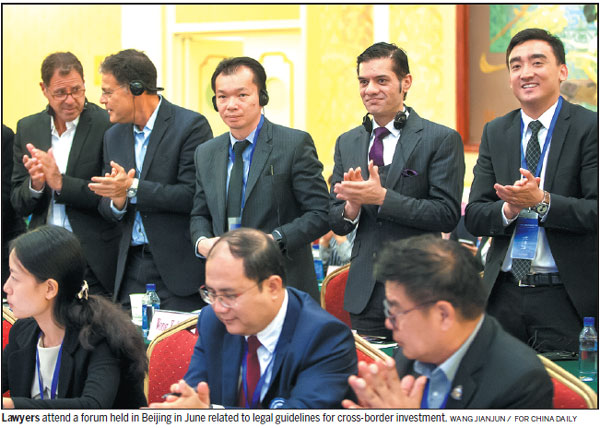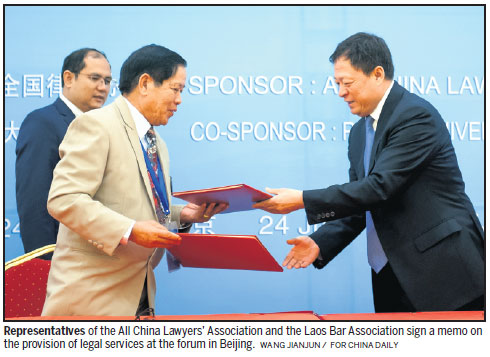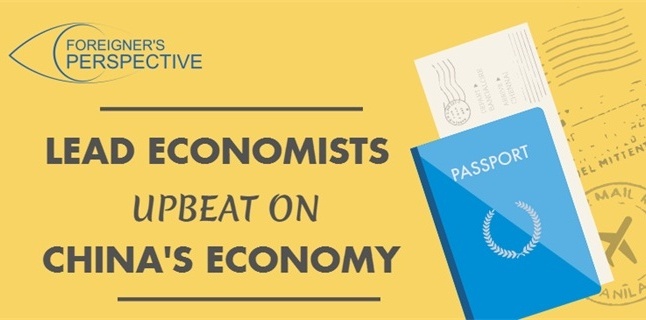Lawyers work to resolve cross-border disputes
Legal professionals from China and countries participating in the initiative are establishing a mechanism to counter a growing problem that could become an obstacle to development, as Zhang Yan reports.
In recent years, China's rapid economic development and growing international role have seen a large number of Chinese enterprises expanding overseas or planning to invest in countries participating in the Belt and Road Initiative.
However, the Ministry of Justice said the process of "going global" has seen a sharp rise in the number of cross-border legal disputes and cases of arbitration involving Chinese businesses.
Meanwhile, many Chinese investments in countries that have embraced the initiative have failed as a result of differences in legal procedures and national cultures.

Faced with the growing number of cross-border lawsuits, Chinese lawyers and their counterparts in 65 countries participating in the initiative have compiled guides of foreign laws, with the aim of providing legal support for businesses and reducing the risks they face when investing overseas, according to Wang Junfeng, chairman of the All China Lawyers Association.
"Legal services are important for safeguarding Belt and Road projects, and a proper legal system is crucial for forging ahead with projects such as transnational investment and building strategic maritime channels," he said.
Professional support
In 2013, President Xi Jinping proposed the Silk Road Economic Belt and the 21st Century Maritime Silk Road, known together as the Belt and Road Initiative.
As an active exploration of a new model of international cooperation and global governance, the initiative embodies development, cooperation and mutual benefit.
According to Xiong Xuanguo, vice-minister of justice, since 2013, the trade volume between China and participating countries has increased greatly, but legal services have "lagged far behind the practical needs required for social and economic development".
Statistics from the Ministry of Commerce show that last year, the total import and export volume between China and the 65 participating countries reached 6.3 billion yuan ($940 million), while Chinese investment in those countries was $14.5 billion.
Chinese businesses also established 56 economic and trade cooperation zones in more than 20 participating countries, with a total investment value of more than $18.5 billion. That generated $1.1 billion in tax revenues and created about 180,000 new jobs in participating countries.
He Yong, secretary-general of the lawyer's association, said cooperation between Chinese lawyers and their foreign counterparts will "offer professional legal support, including dealing with lawsuits and offering legal advice to their clients, and boost trade and promote international economic and cultural exchanges".
According to the Ministry of Justice, a typical example occurred in March last year, although it declined to name the parties involved.
The ministry said a State-owned company which makes safety and monitoring equipment in Beijing signed an investment agreement related to research and development with a technology company in Israel.
The Israeli company claimed to have bought the rights to a mature technology and had also obtained a patent license granted by local authorities.
The Chinese side hired the Beijing Globe-Law Law Firm to conduct a survey of the Israeli company to ensure its authenticity, the application of the technology and its ownership rights in the Chinese market.
"We sought assistance from our counterparts at leading Israeli law firms who specialize in intellectual property protection and are familiar with Israeli law and legal procedures. They were able to collect information or connect with relevant local authorities to offer valuable information," said Wang Zhengzhi, a senior partner at Beijing Globe-Law.
The Israeli lawyers discovered that the company had not obtained patents issued by Israel's intellectual property protection authorities, and its technology was not as mature as claimed.
Last month, concerned that it might face risks if it invested in the technology, the Chinese company consulted lawyers. As a result, it decided to revise the agreement and invest in several stages, based on the project's technological research and development.
"Professional legal support will play an essential role in helping businesses to take the initiative in negotiations and make the correct business decisions and then maximize their commercial interests," Wang Zhengzhi said.
Practical guidance
According to Jiang Junlu, deputy director of the lawyers' association's international commission, last month, lawyers from top-tier law firms in China and participating countries compiled two books containing practical guidance on laws related to foreign investment.
Jiang said the advice included in the books covers laws related to investment, trade, labor, environmental conservation, intellectual property and dispute resolution.
The first volume, which focuses on investment laws in 43 countries, including Myanmar, the Philippines and Russia, has already been published. The second, related to the remaining 22 countries, will be published at the end of the year.
"This guidance will enable Chinese politicians, businesspeople and experts to fully understand the legal systems and environments involved in the initiative and provide legal support for Chinese businesses to ensure they have safe, smooth investments abroad," Jiang said.
Khamsay Soulinthone, chairman of the Laos Bar Association, said: "The idea of the Belt and Road Initiative put forward by China is very creative and considered revolutionary. Although lawyers in different countries face different challenges, they all work for global equality and justice. It's the right time to set up a regional lawyers' cooperation organization."
Going global
Although cooperation between China and countries participating in the initiative has made great progress, the lawyers' association still faces practical challenges in expanding legal cooperation.
Shen Lin, a senior official at the department of directing lawyers and notarization at the Ministry of Justice, said most participants are underdeveloped economies with unsound legal environments, and they are in urgent need of financial and technical support from China.
"In the past few years, failures in foreign investments involving Chinese businesses have risen, and it's essential to boost cooperation with legal professionals in participating countries to improve professional legal services to help Chinese investors," she said.
According to He, of the lawyers' association, to improve cooperation the association has established a database containing the details of 86 Chinese lawyers and 121 foreign lawyers from top-tier firms, who will "use the platform to analyze the laws and share information and experience to better serve Belt and Road projects".
His comments were echoed by legal professionals in participating countries.
Prashant Kumar, chairman of the Bar Association of India, said: "The Belt and Road Initiative is considered a historic moment and opportunity. It has built a communication bridge for lawyers from China and relevant countries to handle legal disputes and set an example to resolve problems between nations in the future.
"Although we have differences in laws, culture and environment, I believe our lawyers will join with their Chinese counterparts to unite consensus and create values together."
According to Jiang, the lawyers' association will set up representative offices in participating countries and regions to build joint operating relationships and business alliances with foreign counterparts.
In addition, the association will establish an annual forum with its foreign peers to discuss concerns and exchange views on international legal services during the promotion of projects related to the initiative, including infrastructure construction, international trade and shipping finance.
"The publication of this guidance is timely for businesspeople in all relevant countries, and it's crucial for Chinese investment in foreign countries," said Maria Slazak of the National Council of Legal Advisers in Poland.
"The Belt and Road Initiative is an opportunity for cooperation, including sharing information and the mutual exchange of needed products, which will help Chinese lawyers to go global," she said.
Contact the writer at zhangyan1@chinadaily.com.cn


(China Daily 08/10/2017 page6)
















